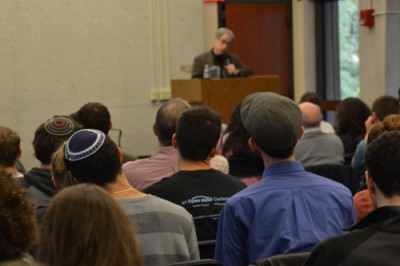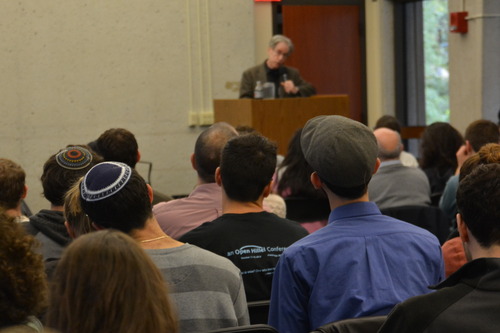
In Palestinian activist circles,“Anti-normalization” broadly refers to the idea that pro-Palestinian activists should not partner in any way with Zionists or Zionist groups lest they be seen as making the occupation seem like an acceptable, or “normal” state of affairs. Normalization has been a controversial topic within Open Hillel since at least their conference at Harvard last October, but was shoved into the spotlight when Open Hillel outreach coordinator Holly Bicerano published an op-ed in the Times of Israel Dec 7 explaining her decision to leave the movement, alleging, among other things,
In an 8-1 vote, Open Hillel leaders decided—shamefully—to form a committee in order to address the issue of anti-normalization in Open Hillel.
She clarified this claim in an interview with New Voices a week later, saying, “I can tell you with absolute certainty that there are several organizers who want anti-normalization to be taught and implemented in Open Hillel.”
People within the movement are adamant that while yes, some Open Hillel members want the organization to adopt anti-normalization policies, that was never the committee’s purpose, and that Open Hillel does not take stances on political issues (a claim Bicerano calls “nonsense”). Harvard student Rachael Sandalow-Ash, a founding member, pointed out that “normalization” was not a concern at the movement’s inception, since it was founded “to promote dialogue, cooperation, and partnerships between Jewish and Palestinian groups.”
This stance led to internal controversy leading up to the conference, when some newer members expressed concern that some of the conference’s panels featuring Zionist and Palestinian spokespeople were “normalizing.” “The point of contention was whether by putting on events that would be considered ‘normalizing,’ we would effectively be taking a position; on the other hand, those opposed to anti-normalization argued that that would also be taking a position, so it was kind of a catch-22,” said Evan Goldstein, a student at Boston College and a member of Open Hillel.
The issue had been coming up frequently in what Emily Unger, a founding member and student at Harvard, described as “quite an interesting and vigorous debate” over the Open Hillel email listserve until it reached the point when, she said, “it became clear that email wasn’t the best forum for” this conversation because people were defining “normalization” in different ways and largely talking past each other. To better address the issues, organizers found four volunteers “with very different views on anti-normalization,” according to Sandalow-Ash, to organize an informal 2-part “conversation” around the question of normalization. As Bicerano mentions in her article, the first session featured only pro-BDS speakers. According to organizer Naomi Dann, this was to allow Palestinians themselves to define what “normalization” and “anti-normalization” mean to them, “They expressed opinions that were their own, and we listened,” she said. The larger extent of this meeting’s influence on members of the movement remains unclear.
While Bicerano characterizes that meeting as indicative of Open Hillel’s far-left agenda, Goldstein disagrees, “In my view the fact that leftist intellectuals were called upon to discuss a term that was essentially invented by leftist political movements is neither strange nor evidence of bias,” he said. Unger alleges that Bicerano misunderstood the committee’s mission to begin with since she joined the formative call “very late” and “missed the entire discussion on the issue… [though she] was there for the vote and for the tail end of the phone call.”
Though it has yet to happen–due solely to scheduling conflicts with students’ finals and winter breaks, organizers insist–the committee’s second event is to be a conversation about how Open Hillel as an organization will relate to issues of normalization and anti-normalization. Almost all Open Hillel members interviewed for this article emphasized that the “anti-normalization committee” had no purpose other than to set up these conversations around a controversial yet relevant issue, and once the conversations happen, it will cease to exist. According to Sandalow-Ash, the formation of such ad-hoc committees is actually normal practice for the movement, “We have formed hundreds if not thousands of these ad-hoc committees over the course of our campaign; they dissolve after the task is complete,” she said.
The question of normalization and what Open Hillel’s proper relationship to it remains a hot one within the movement. Even some members who vehemently oppose anti-normalization policies still support having the conversations. “I staunchly and passionately oppose anti-normalization efforts. I think in many ways, they parallel Hillel’s Standards of Partnership but from a different angle,” said movement organizer and steering committee member, recent Brown graduate Lex Rofes. “Despite that, however, I voted to form the committee to learn about what normalization is (and isn’t), so that all of us could educate ourselves.” He sees this incident and the internal debate surrounding it as exemplary of what the movement wants to happen in Hillels, saying this is “what we are asking Hillels around the country and the world to do–it would be sad if we didn’t do it in our own campaign.”
Unger believes views such as Rofes’ are representative of the “vast majority of people in Open Hillel [who] oppose the anti-normalization movement.”
Though outnumbered, the minority remains vocal in its disapproval. “Many of our members (myself included) are concerned that the committee is a waste of our organization’s time,” said steering committee member Aryeh Younger, a law student at Ohio State. Though he concedes that the committee has not “as of yet” had any influence over the campaign’s policies, he feels that “anti-normalization, as it is practiced by university affiliated organizations around the country, is deeply antithetical to Open Hillel’s principles of open dialogue and free speech,” adding that “a movement predicated on hostility to diversity of opinion is anathema to Open Hillel.”
Perhaps it is for this reason that Younger is less outright dismissive of Bicerano’s criticisms as many others within the movement. “It is critical for the rest of Open Hillel to take note of her criticisms, so that we can improve our organization and remain focused on our goal,” he said.
Derek M. Kwait graduated from the University of Pittsburgh and is editor in chief of New Voices.

